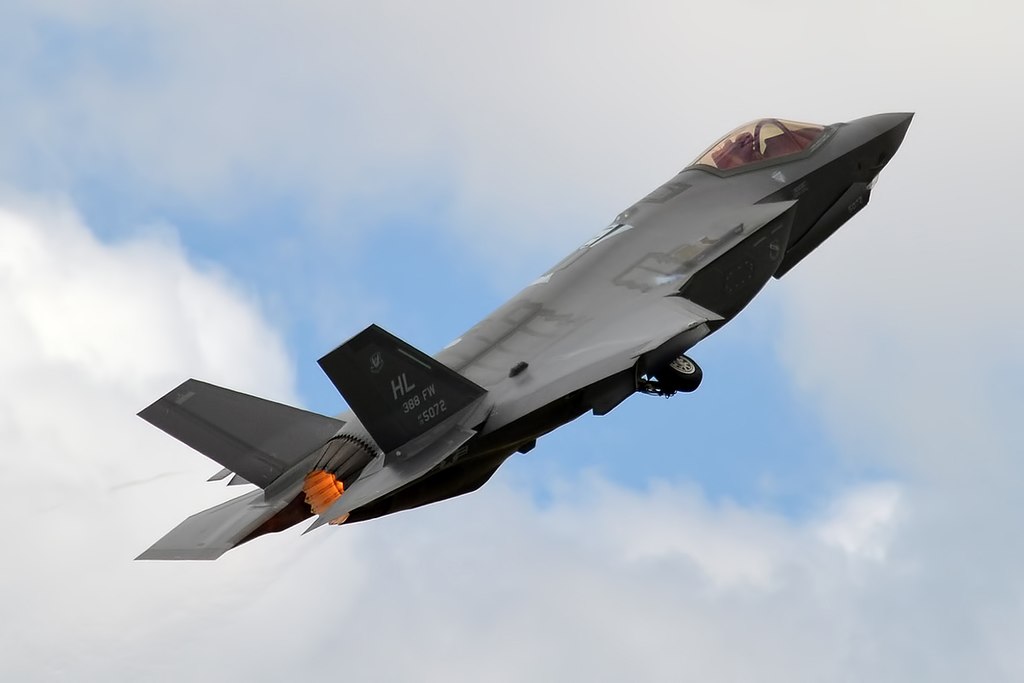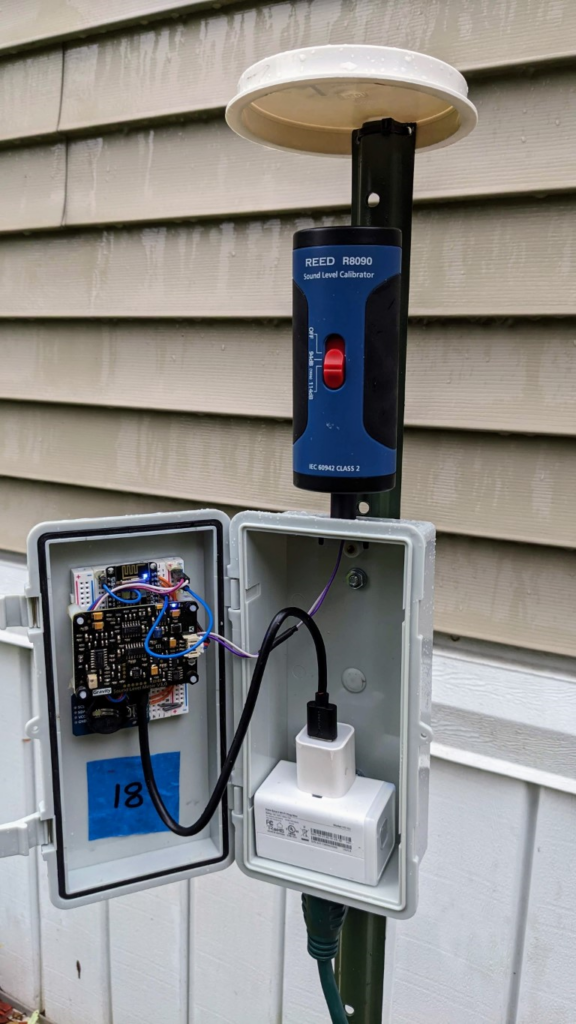
This story was produced as part of a collaboration with the Center for Public Integrity, a newsroom that investigates inequality.
On a hot July afternoon, Amanda Crim was sitting on her porch when she was startled by the abrasive noise of an F-35 fighter jet flying by her house.
She pulled her phone out to record the jet after noticing there was another one flying by. She recalled, vividly, just how loud it was.
Video courtesy Amanda Crim.
“This might have been the first time I heard them while I was outside,” Crim said. “I was like, ‘Wow’. That’s part of why I took the video was because I wanted to have visuals so that I could go and check to see if it was actually an F-35. It was very loud. I remember as I was recording it, I held my phone in one hand and put my free ear to my shoulder, just trying to plug my ear. It was definitely something that I didn’t want to listen to. It was unpleasant.”
Her family moved into their neighborhood in 2012. They knew the Dane County airport was close by but were unaware of the fighter jet F-16s deployed there. She recalled those jets being noisy but not to the extent of the current F-35s.
“I remember hearing about the F-35s coming and (U.S. Senator) Tammy Baldwin was negotiating and pushing for that,” she added. “There was neighborhood pushback from that. I didn’t attend any of the protests. I did try to be involved in my local community groups on social media. That was when I heard about it.”
Crim is one of many residents of the North and East Sides of Madison who have for years opposed the addition of F-35 fighter jets to the Wisconsin Air National Guard 115th Fighter Wing, warning of noise pollution that could make the neighborhood unlivable as well as potentially hazardous water pollution. Now that the F-35s were deployed earlier this year, they say their fears have been realized, as the noise of the fighter jets impacts their daily lives. And because the neighborhoods around the airport are disproportionately populated by people of color, advocates are taking the case to the federal government, alleging that the presence of the fighters is a racist civil rights violation — even if it’s unintentional.
What’s going on?
The Joint Strike Fighter Program was developed to produce the F-35 Lighting II Joint Strike Fighter Aircraft, hoping to replace the aging F16 aircraft. This involves the beddown of one F-35 squadron consisting of 18 primary authorized aircraft with two backup aircraft inventory at two selection locations.
In December 2017, the USAF and the NGB selected the Truax Field Air National Guard Base in Madison from five options as a location for the jets. The 187th Fighter Wing in Montgomery was announced as the second location. Many residents in Madison living throughout the impacted areas were concerned about the long-term impacts these jets would have.
Steve Klafka has been an environmental engineer in Madison for the last 30 years. He is a part of Safe Skies Clean Water Wisconsin because he lives close to the airport and has always been interested in its impacts on the East Side. He’s always tried to get the airport to be a responsible corporate citizen.
Video courtesy Steve Klafka.
“When the F-35 jets were proposed, I immediately knew it was a terrible idea,” Klafka said. “Why would they bring fighter jets like this to a populated urban area? Other people I know locally, who are into environmental issues, were also upset and got involved. Growing out of this was Safe Skies Clean Water [Wisconsin]. We started up five years ago. it was a fairly informal organization until we decided that we needed to take some legal action.”
Safe Skies Clean Water Wisconsin is a non-profit community-based organization in Madison focused on stopping the harm inflicted by the F35s at the Truax Air National Guard base in Madison. The organization hosted protests and contacted local, state, and federal government officials and representatives trying to get their involvement. Once they realized they weren’t getting as much awareness about the jets, they incorporated as a nonprofit group so they could go to court.
After a final environmental impact statement was completed in 2020, it was announced that the F-35 jets would be coming to Madison. In response, Safe Skies decided to take legal action with support from environmental lawyers at Detroit Mercy because the F-35 fighter jets would result in disproportionate effects on low-income residents and families of color living in communities near the base.
“We filed a lawsuit in federal court over the EIS saying it wasn’t adequate,” Klafka said. “A big part of the problem is the noise impacts that are going to increase because these jets were far noisier than the old jets that we had, the F-16s, and they were going to fly more often. And the Air Force determined that nearly 3,000 people would live in areas that are considered incompatible with residential use.”
A common comeback
Crim recalls a plethora of debates with Madison residents who support the F-35s in the area.
“They are usually like, ‘Oh, get used to it, suck it up. It’s a sense of freedom,’ and all that kind of stuff,” she said. ‘They also often say things like, ‘Well, you shouldn’t have moved near the airport.’ First of all, if you need low-income housing, housing is awful in Madison. You can’t, sadly, be able to look into things and be like,” Oh, I can’t live there because it’s loud’. Even if you have the time and the resources to do that, you don’t have choices. When we bought our house, we knew we were near an airport, but we didn’t know that F-35s would be coming.”
As a science educator in the Madison Metropolitan School District (MMSD), Crim actively stays aware of environmental issues of the F-35s, especially the human impacts of the sound and the equity issues with race.
“I’d really say that my major concerns are the fact that we know that the levels of bounce that the jets are capable of producing are not good for human life,” Crim said. “They’re not good for mental health, they’re not good for physical health. They have all kinds of impacts that they’ve shown that those levels of sounds can cause beyond just hearing.”
She added that, ultimately, the Beddown is bad for low-income and communities of color living in impacted and surrounding areas. She talked about how she is frustrated by the city’s lack of effort to support those affected by the negative impacts of the F-35 jets, especially Black and brown families.
“I work enough with the families of color in our city,” she added. “I know how hard they’re working. I know, to some degree, some of the challenges they face. It’s just a case of a population that doesn’t have the time or resources, typically, to push back against this.”
“I’m a white person and seeing this just continue to happen, where it’s just like, ‘Oh, well. We’re just gonna push this forward.’ Maybe there’ll be a little bit of pushback, but probably not enough to actually have to do anything about it. I’m very concerned about Madison, speaking on the front of things, as being this wonderful progressive city that has such extreme racial disparities,” Crim said. “Then proactively continues practices that make life worse for people of color.”
Residents currently impacted by F-35s jets
Brittany Browning moved to Madison with hopes that things would be better for her and her budding family. She and her husband had heard about how Madison was progressive and were excited about moving to a place that would provide them with opportunities.
“We literally moved up here with nothing to our names into a one-bedroom apartment,” Browning said. “Under the guise that Madison had progressive, liberal, forward-thinking opportunities. Then rent started becoming kind of astronomical. Then we found out that we were expecting another child, and we knew we couldn’t live with the four of us in a one-bedroom apartment.”

(Photo: Wikimedia Commons)
That same year she applied to City Row housing, an affordable housing complex in the Tenney-Lapham neighborhood. They realized that it was cheaper to take out an FHA loan, loans provided by the government for first-time home buyers, than it was to live in affordable housing.
Despite their initial struggle to find affordable housing, she and her husband felt strongly about wanting to stay in Madison. The only place they could afford to buy a home was on the North Side. They’d heard mixed reviews about the North Side, but didn’t think the airport would be much of a problem since they lived near the O’Hare airport while they were in Illinois.
This was years ago, when the loudest planes were the F-16s. Even those were disruptive, Browning said.
“When people kept saying we’d be by an airport, honestly, I didn’t even blink an eye because I’ve lived by [Chicago] O’Hare [International Airport],” she added. “The noise our first few days was so jarring in that house that I wondered if we made the wrong decision. And I still do. I feel like nothing can prepare you for fighter jet noise. It’s not something I had ever been exposed to in my life before.”
Browning recalled a day in 2016 when she and her then two-year-old son were playing at the park in their neighborhood when a fighter jet flew over.
“He ran over to a tree and he crouched down in the fetal position, like they tell you to do in school if there’s a tornado,” she said. “Seeing my two-year-old, I should have been consoling him, but I actually photographed it and sent that to Tammy Baldwin’s office, like ‘Hey, my child can’t play outside because he’s terrified’.”
The F-35s are considerably louder.
She feels like over the years her kids have gotten used to the noise but is still deeply concerned about the impacts this is having on her family and neighbors.
“When the F-35s came around, it was like going back to that initial trauma of that jarring noise, and when you hear that noise and the reverb through your bones, it makes your stomach sick,” she added. “Last week, I wondered if I had popped an eardrum. It makes you feel so physically ill that you question your safety and you can almost relate to people in war zones. That kind of trauma and impact that those families must feel on a daily basis.”
She is also concerned about the jets because the noise can get so loud that it shakes her home, but she doesn’t qualify for noise abatement.
“It permeates every facet of your life,” Browning said. “I volunteer at my kids’ school and teachers stop teaching when these things fly over. If I work from home, if my house is shaking, I have to mute myself on my Zoom calls. And everybody kind of knows like, ‘Oh, well Brittany lives in that area.’
“Honestly, as somebody who is income-limited, it’s really disheartening to feel like I have to live in a home where I know my children are being adversely impacted. Like that eats at me every day. I know a lot of people are worse off even than we are.”
Browning is concerned about where Senator Baldwin’s priorities are and is frustrated that she hasn’t received a response from her or her team about what she’s doing to protect her family and community from the negative effects of the F-35 jets.
“I feel like if you follow the money, you look at Tammy Baldwin’s donors,” she added. “Tammy seems to have a foot in with some of these corporations like Lockheed Martin. Do you want to support Lockheed Martin or are you working for those of us in Wisconsin who are fearful for our health?”
Other Madisonians have written op-eds in The Cap Times and Tone Madison criticizing Senator Baldwin for supporting the F-35s in their communities.
In an email to Madison365, Baldwin’s office said she helped secure a $798,000 grant from the Department of Defense to conduct community outreach and noise mitigation planning in preparation for the F-35s arrival. Her office also noted that the Air National Guard ceased using firefighting elements that contain PFAS, due in part to the facility upgrades spurred by the arrival of the F-35s. The email also said the F-35s helped maintain the 1,600 existing jobs in the 115th Fighter Wing and added 64 more.
“I am committed to continuing to work with community members in Dane County to ensure the F-35’s posting will work for this community and that the Fighter Wing is a good steward of our land, air, and water,” Baldwin said in a written statement. “I am fighting to ensure that Wisconsin gets the resources it needs to create and implement a noise mitigation plan.”
Safe Skies Clean Water Wisconsin pursues a Title VI complaint
In March 2022, Safe Skies Clean Water filed a Title VI complaint with the Environmental Protection Agency against the Wisconsin Air National Guard, Governor Tony Evers, the Wisconsin Department of Natural Resources, Dane County Executive Joe Parisi, Dane County Regional Airport, airport director Kimberly Jones, the city of Madison and Mayor Satya Rhodes-Conway.
The organization is arguing that the city of Madison is in violation of Title VI of the Civil Rights Act of 1964. Title VI bans any organization that receives federal funding from discriminating based on race, color, or national origin. A Title VI complaint doesn’t have to prove intentional discrimination if the agency accepts the complaint for investigation.
The complaint is still at the jurisdictional review stage, meaning that EPA hasn’t determined whether the complaint meets the requirements for an investigation.
EPA defines environmental justice as the fair treatment and meaningful involvement of all people regardless of race, color, national origin, or income, with respect to the development, implementation, and enforcement of environmental laws, regulations, and policies. This ensures that everyone enjoys the same degree of protection from environmental and health hazards, and equal access to decision-making process(es) to have a healthy environment to live, learn, and work. In the Safe Skies complaint, the dominant factor is the violation of Title VI.
Safe Skies stated that the Wisconsin Department of Natural Resources, the Wisconsin Air National Guard, City of Madison and other state leaders have failed to protect Madison residents from the negative effects of the F-35 jet beddown at the Dane County Regional Airport. The three most important impacts are: pre-and polyfluoroalkyl substances (PFAS) contamination, which is impacting the Starkweather Creek, Lake Monona, and Yahara chain of lakes, extreme levels of noise from the F-35 jets flying and the placement of low-income housing in impacted areas. The full complaint can be viewed here.
Nick Schroeck serves as an associate professor of law and the director of the Environmental Law Clinic at the University of Detroit Mercy School of Law. Safe Skies Clean Water Wisconsin reached out to him a couple of years ago looking for legal help.
“They saw some work that we had done previously on some of these Title VI complaints,” Schroeck said. “These are the civil rights complaints through EPA. They actually reached out to me, and then I had some clinic students, this was during the peak of the COVID-19 pandemic.”
The clinic typically operates in Michigan, but they took on this case since they were already doing virtual work. Under Schroeck’s direction, the law students began conducting research on this case.
“I had my students do some research at first looking into what the potential issues were,” he said. “We found that noise and water contamination with PFAs were issues. We were also just concerned about the sort of placement of this facility in an area that has residential homes, right around this community. Then looking a little bit deeper, we saw that the racial composition of the people that were closest to the airport, there was a much higher proportion of non-white residents in that community. Then we dug a little deeper and we learned about the Hmong community and a lot of the fishing that they do there in these lakes, and how PFAS contamination can potentially be a problem there, too.”

After his clinic students further explored these issues and received more information from Safe Skies, they agreed that this would be a good opportunity to use the Title VI complaint process through EPA. Schroeck did mention a challenge that they are up against because the jets are placed at a National Guard base owned by the U.S. military, which is exempt from receiving EPA funding.
“We’re pretty confident after a lot of legal research that because Wisconsin receives funds from EPA, because Madison and the countless surrounding counties received funding, including that airport, that they should be subject to Title VI,” he said. “And that we should be able to file a complaint for this facility, but under Wisconsin jurisdiction rather than the US military.”
Although Schroeck is apprehensive about all of the negative impacts from this base, he is extremely concerned about the lasting effects of the noise from the F-35 jets on Madison communities.
“The noise is really significant and that’s something that we really want EPA to take a look at,” he said. “It’s important for Madison, of course, but we’re also concerned about these facilities around the country. One of the reasons why we wanted to make sure we got involved here is that this isn’t the only place these jets will be located. There’s several sites where they could end up around the country. We just wanted to make sure that everyone is at least protected under the law, and that we don’t have disproportionate impacts on low-income and communities of color. That’s why we wanted to at least put a marker down here in Madison.”
This team of lawyers decided to support Safe Skies to ensure that there is a fully vetted process that considers all of the impacts of the jets. Schroeck added that he hopes people are either relocated or are provided with noise/soundproofing in their homes. He is also hoping that Madison provides an effective clean-up to get the PFAs out of the soil and water.
Now what?
Reporters have noted that the impacts of the noise from the jets could take up to years to reduce.

(Photo supplied by Steve Klafka)
On Oct. 14, Klafka was able to record a video of another F-35 jet flying over his home. He and his team are continuing to expand their noise monitoring network. These new monitors are funded by Safe Skies Clean Water Wisconsin and the Schenk-Atwood-Starkweather-Yahara (SASY) Neighborhood Association.
They recently installed another monitor at the Oak Park Terrace mobile home park. This will be helpful because the mobile home trailer overlooks the excess parking lot at the airport. Klafka has also met with teachers at the Shabazz High School on Sherman Ave., and they will install a noise monitor once they can obtain an exterior electrical plug.
Despite the awareness of the negative effects of the F-35 jets in communities, the city of Madison continues to approve low-income housing and apartment complexes located within the impacted area of the airport and the fighter jet training. There are 245 low-income apartments on East Washington and Fair Oaks Avenue, which were approved in June of last year and 192 apartments on East Washington Ave. and Hwy 30, which were approved earlier this year in June.
“I would love it if we embarrassed our city, embarrassed our mayor,” Klafka concluded. “Because sometimes we get voted as the number-one city by the tourists and people, and they kind of ignore all the stuff that’s happening and want to downplay it. I think it’s really important to kind of wake them up about that.”



























